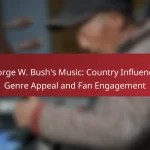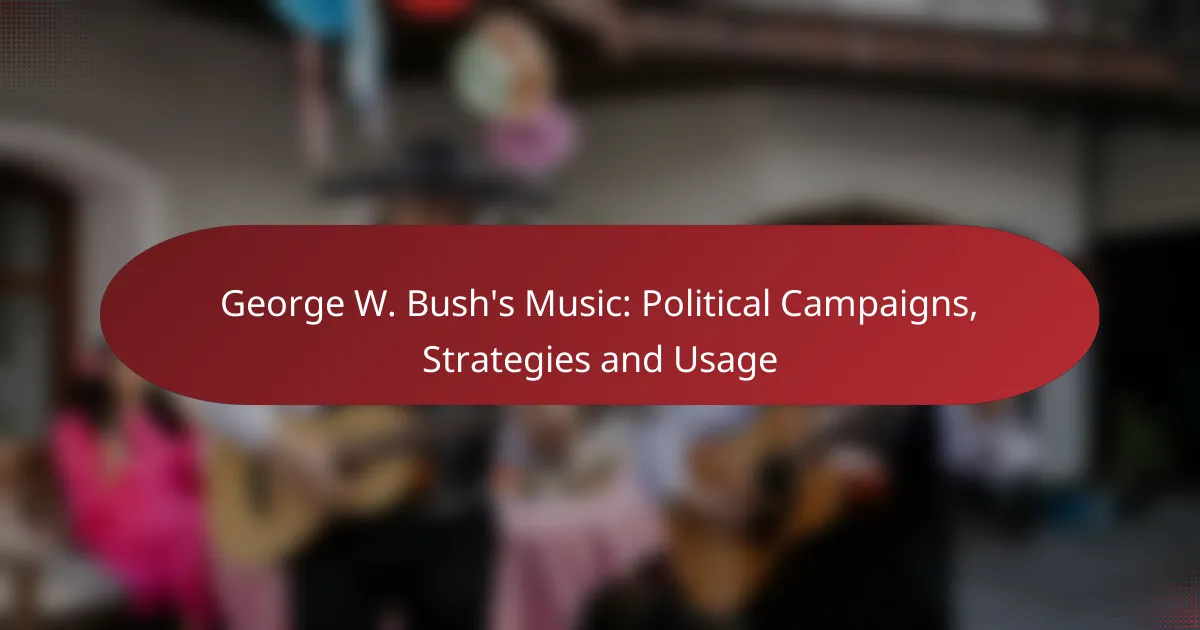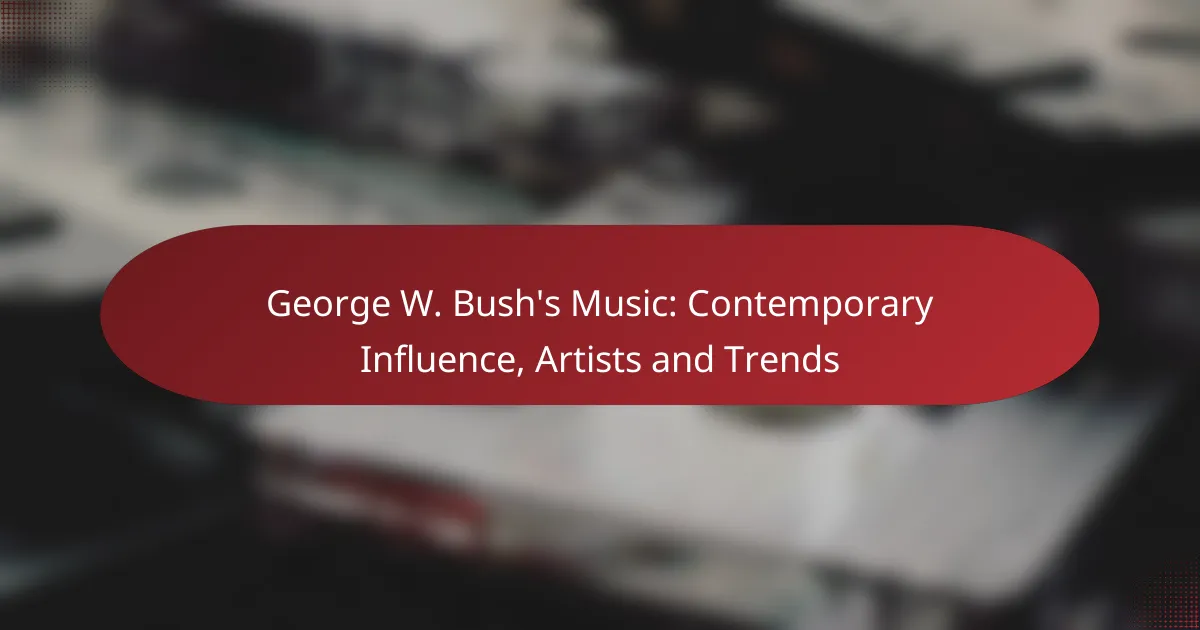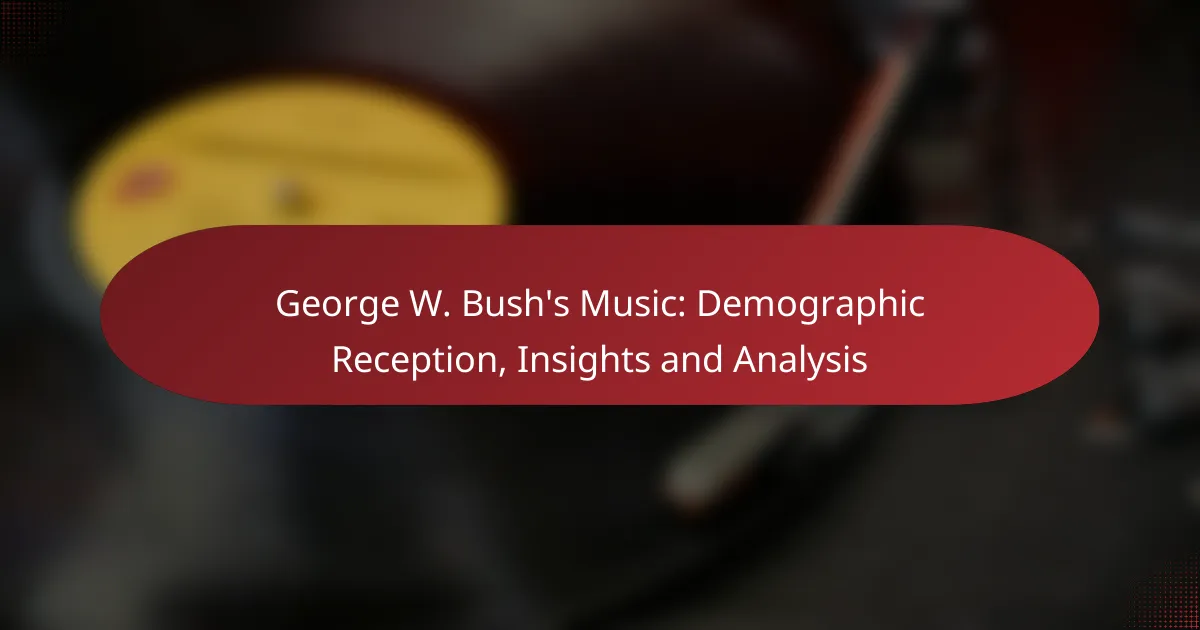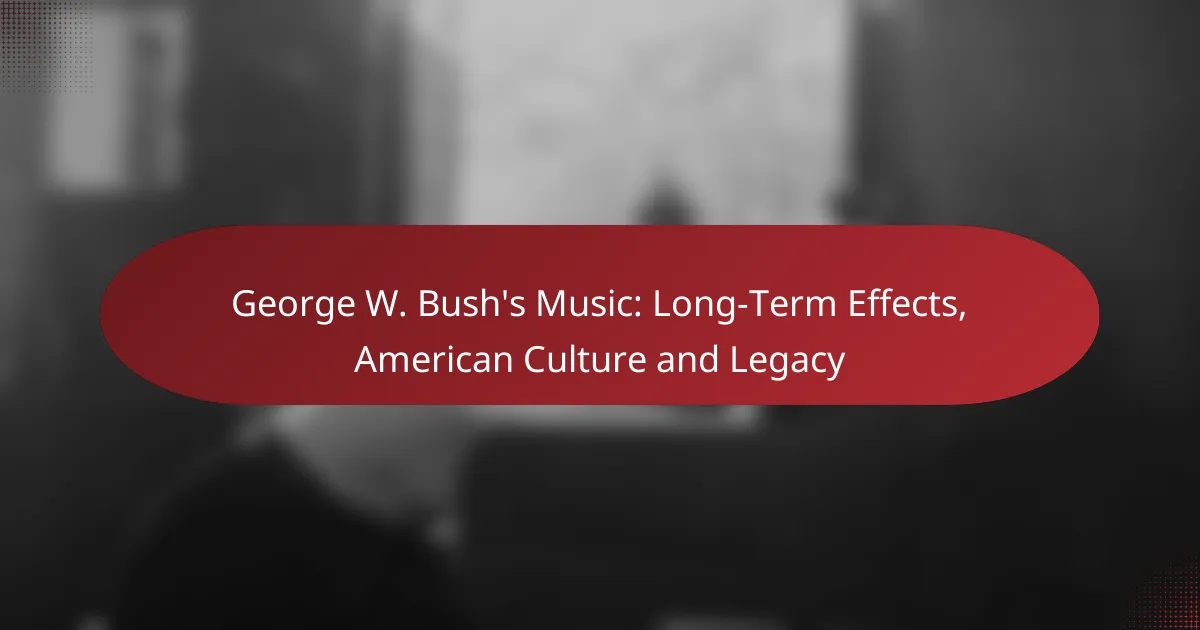George W. Bush’s presidency marked a pivotal moment in American music culture, particularly through his endorsement of country music and the rise of patriotic themes. This era saw a surge in political commentary within lyrics, reflecting the societal mood and the impact of significant events like September 11, 2001. As artists responded to his administration’s policies, the music landscape evolved, showcasing both support and dissent in the face of contemporary issues.
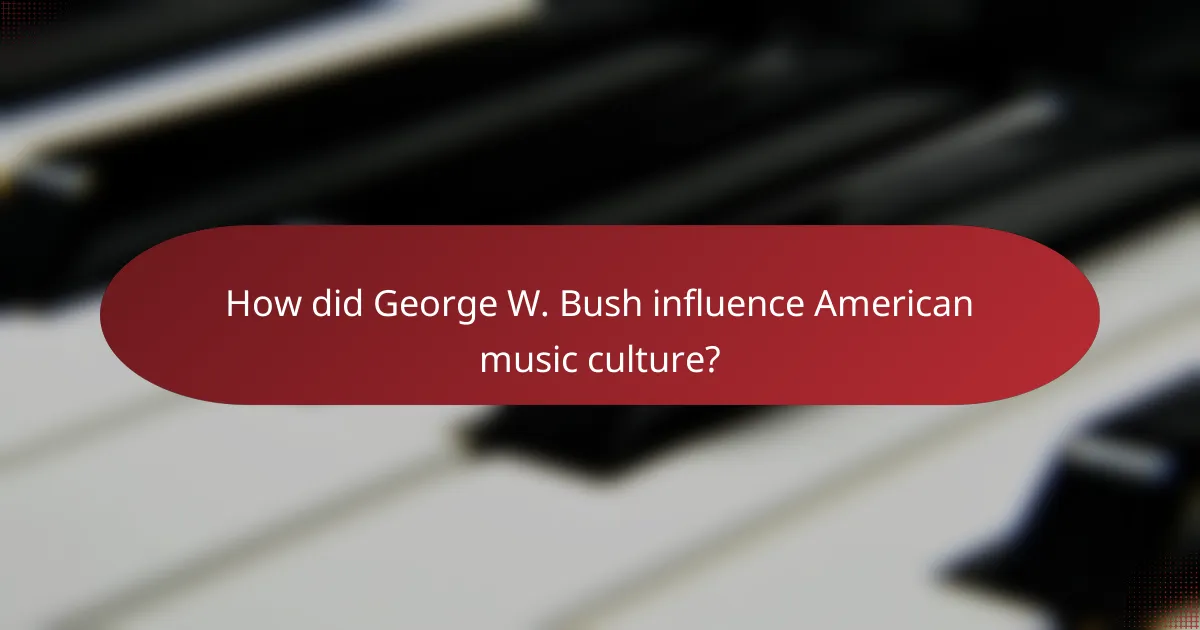
How did George W. Bush influence American music culture?
George W. Bush significantly influenced American music culture through his promotion of country music, support for patriotic themes, and impact on music festivals. His presidency coincided with a rise in the popularity of country music, which often reflected the sentiments of his administration and the national mood during his terms.
Promotion of country music
During George W. Bush’s presidency, country music gained immense popularity, becoming a dominant genre in the American music scene. Artists like Toby Keith and Alan Jackson, who often expressed themes of patriotism and American pride, saw their careers flourish during this time.
Bush’s connections with country music artists helped bridge the gap between politics and popular culture. His appearances at country music events and endorsements of certain artists contributed to the genre’s mainstream acceptance, making it a staple in American households.
Support for patriotic themes
Bush’s administration emphasized patriotic themes, which resonated deeply in the music of the era. Songs that celebrated American values, military service, and national unity became prevalent, often serving as anthems during significant national events.
Artists responded to the political climate by producing music that echoed the sentiments of the time, with many songs becoming rallying cries for support of the military and national pride. This trend not only shaped the music landscape but also influenced public sentiment and cultural identity.
Impact on music festivals
Under Bush’s influence, music festivals began to incorporate more patriotic elements, reflecting the national mood. Events like the Country Music Association Festival featured performances that highlighted themes of unity and support for the troops, drawing larger crowds and media attention.
These festivals became platforms for artists to express their political views and connect with audiences on a deeper level. The blending of music and patriotism at these events helped solidify the role of music as a form of cultural expression during a time of national significance.
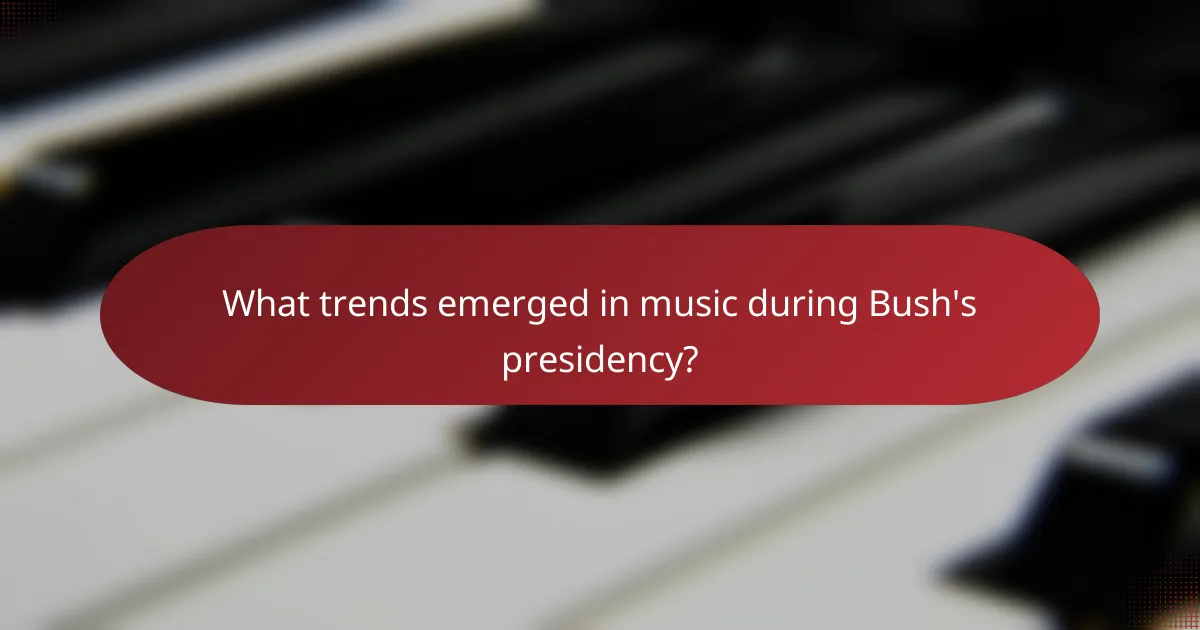
What trends emerged in music during Bush’s presidency?
During George W. Bush’s presidency, music saw a notable surge in patriotic themes, a rise in country and rock genres, and a significant increase in political commentary within lyrics. These trends reflected the societal mood and political climate of the early 2000s, particularly in the aftermath of events like September 11, 2001.
Rise of patriotic songs
The aftermath of the September 11 attacks sparked a wave of patriotic songs that resonated with many Americans. Artists across various genres began to produce music that celebrated national pride and unity, often incorporating themes of resilience and hope. Songs like “Courtesy of the Red, White and Blue” by Toby Keith became anthems of patriotism during this period.
This trend was not limited to country music; rock and pop artists also contributed to the patriotic wave, creating a diverse array of songs that appealed to a broad audience. The rise of these patriotic songs highlighted a collective response to national trauma and a desire for solidarity.
Popularity of country and rock genres
Country and rock music gained significant traction during Bush’s presidency, reflecting the cultural landscape of the time. Country music, in particular, saw a surge in mainstream popularity, with artists like Keith Urban and Carrie Underwood achieving commercial success. This genre often aligned with conservative values, resonating with the political climate of the era.
Rock music also thrived, with bands like Green Day and Linkin Park addressing social issues and political discontent in their work. The blending of these genres created a rich tapestry of sounds that appealed to various demographics, showcasing the evolving musical tastes of the American public.
Increased political commentary in lyrics
As political tensions rose, many artists began to incorporate explicit political commentary into their lyrics. This shift allowed musicians to express their views on issues such as the Iraq War, civil liberties, and social justice. Songs like “American Idiot” by Green Day and “Where Is the Love?” by The Black Eyed Peas exemplified this trend, challenging the status quo and encouraging listeners to engage with political discourse.
This increased political commentary in music served as a platform for artists to voice their concerns and connect with audiences who felt similarly disillusioned. The blending of entertainment and activism became a hallmark of the era, influencing the way music was consumed and understood in a politically charged environment.
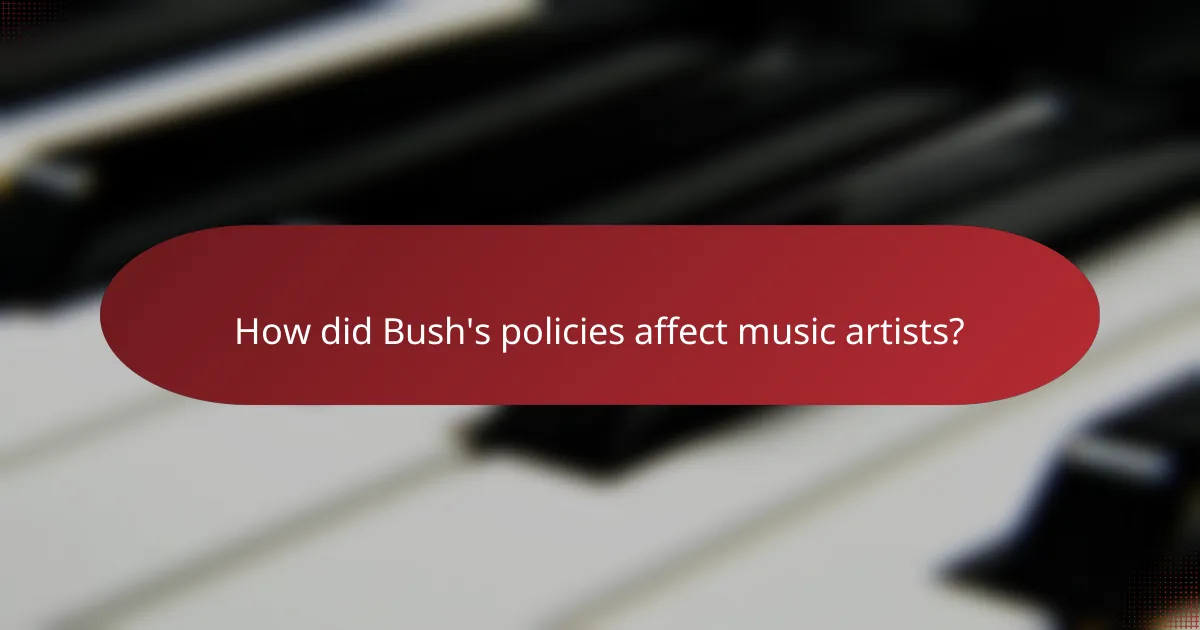
How did Bush’s policies affect music artists?
George W. Bush’s policies significantly influenced music artists by shaping the themes and narratives prevalent in their work. His administration’s stances on war, social issues, and economic conditions prompted both support and criticism from the music community.
Support for military-themed artists
During Bush’s presidency, there was a notable rise in support for military-themed artists, particularly those who celebrated patriotism and the armed forces. Artists like Toby Keith gained prominence with songs that resonated with pro-military sentiments, often reflecting the national mood in the wake of events like 9/11.
This support translated into increased visibility and sales for artists who aligned their music with military themes, often resulting in chart-topping hits and lucrative concert tours. The cultural climate encouraged a wave of patriotic music that reinforced the administration’s messaging.
Criticism from protest musicians
In contrast, many protest musicians emerged during Bush’s presidency, voicing their dissent against the Iraq War and various domestic policies. Artists such as Green Day and Bruce Springsteen used their platforms to critique the administration, leading to a resurgence of politically charged music.
This backlash not only influenced the content of their songs but also sparked broader conversations about freedom of expression and the role of artists in society. The tension between military support and protest music highlighted the polarized views of the era.
Impact on music sales and streaming
The political climate under Bush had a tangible impact on music sales and streaming patterns. Artists who produced pro-military or patriotic music often saw spikes in sales, particularly during key national events or anniversaries related to the military.
Conversely, protest music gained traction on streaming platforms, appealing to listeners seeking alternative perspectives. This duality in music consumption reflected the divided sentiments within society, with listeners gravitating towards artists that resonated with their personal beliefs and experiences.
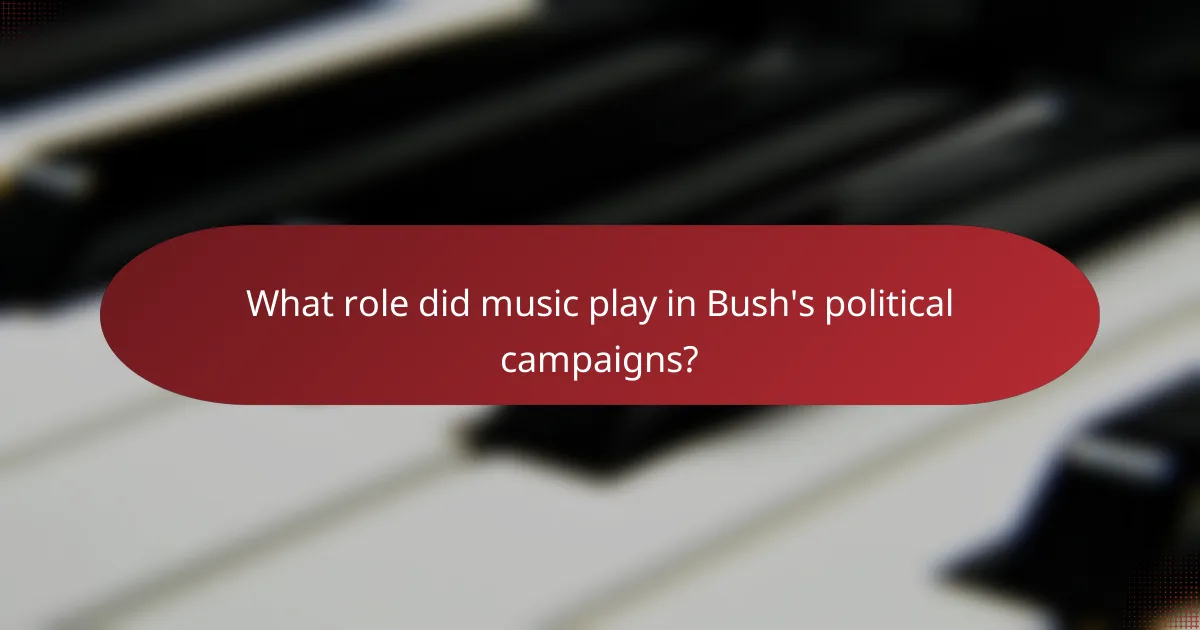
What role did music play in Bush’s political campaigns?
Music played a significant role in George W. Bush’s political campaigns by enhancing his public image and energizing supporters. Through carefully selected songs and celebrity endorsements, music became a tool for rallying voters and creating a memorable campaign atmosphere.
Campaign theme songs
Campaign theme songs were integral to Bush’s political strategy, often reflecting his values and connecting with voters emotionally. For instance, “God Bless the U.S.A.” by Lee Greenwood became a staple during his campaigns, resonating with themes of patriotism and national pride.
Choosing the right theme song can amplify a candidate’s message, creating a memorable association in the minds of voters. Songs that evoke strong emotions or align with campaign narratives can significantly influence public perception.
Celebrity endorsements
Celebrity endorsements in Bush’s campaigns helped to attract media attention and reach broader audiences. High-profile figures like Kid Rock and Toby Keith publicly supported Bush, leveraging their fan bases to enhance his appeal among specific demographics.
Endorsements can lend credibility and relatability to a candidate, especially when the celebrity’s values align with the campaign’s message. However, it’s crucial to choose endorsers who resonate with the target audience to maximize impact.
Use of music in rallies
Music at rallies served to energize crowds and create a festive atmosphere, making events more engaging for attendees. Upbeat songs played before and during speeches helped to maintain enthusiasm and encourage participation.
Incorporating live performances or popular tracks can enhance the overall experience at campaign events. However, it’s essential to ensure that the music aligns with the campaign’s message and does not overshadow the candidate’s speech or platform.
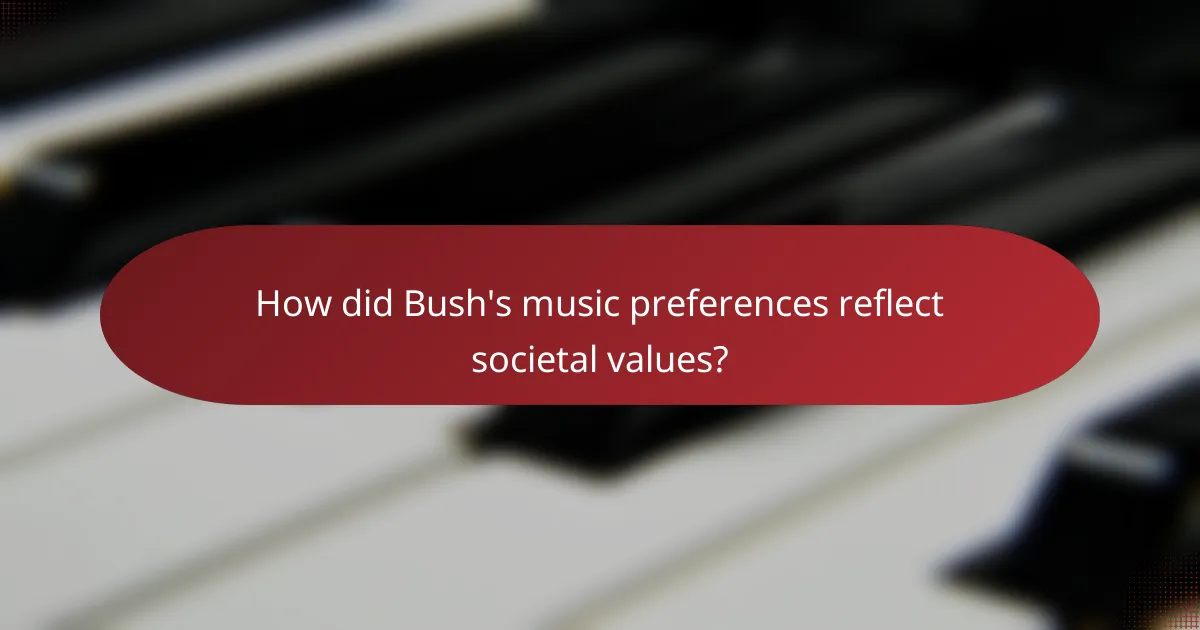
How did Bush’s music preferences reflect societal values?
George W. Bush’s music preferences mirrored the societal values of his time, emphasizing traditional American themes and a connection to the past. His choices often resonated with the sentiments of patriotism, family, and community, reflecting a broader cultural landscape that valued these ideals.
Connection to traditional American values
Bush’s music selections frequently included classic American genres such as country, rock, and blues, which are deeply rooted in the nation’s cultural heritage. These genres often highlight themes of hard work, resilience, and the American spirit, aligning with the values many Americans hold dear.
For example, artists like Johnny Cash and Willie Nelson, who embody traditional American narratives, were often favored in his playlists. This choice not only reinforced a sense of nostalgia but also connected his presidency to the foundational values of the country.
Influence on youth culture
While Bush’s music preferences were largely reflective of traditional values, they also had an impact on youth culture by bridging generational gaps. His appreciation for classic rock and country music introduced younger audiences to these genres, fostering a renewed interest in their roots.
Events like the annual White House Easter Egg Roll often featured live performances from artists that appealed to both older and younger generations, creating a shared cultural experience. This blending of tastes encouraged a dialogue between generations, promoting a sense of unity through music.
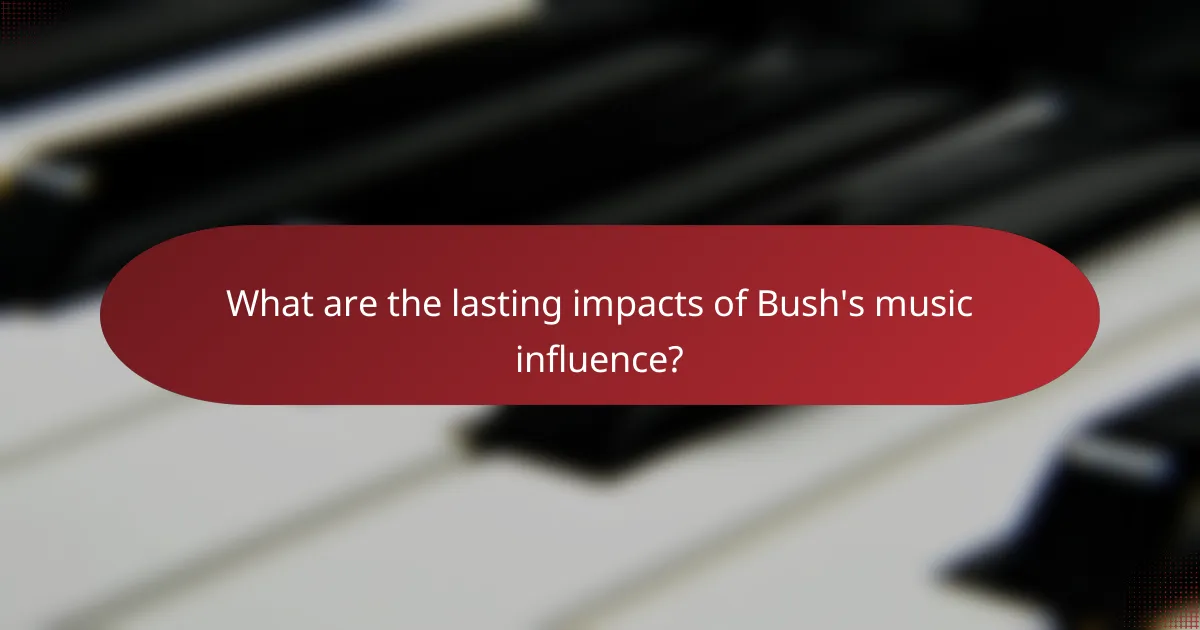
What are the lasting impacts of Bush’s music influence?
George W. Bush’s music influence has left a significant mark on American culture, particularly in the realms of country and protest music. His presidency coincided with a period where music became a powerful tool for political expression and social commentary.
Legacy in modern country music
The influence of George W. Bush on modern country music can be seen in the themes and narratives that artists explore. Many contemporary country songs reflect sentiments of patriotism, resilience, and the struggles of everyday Americans, echoing the sentiments prevalent during his presidency.
Artists like Toby Keith and Brad Paisley have incorporated elements of Bush’s era into their music, often addressing topics such as military service and national pride. This connection has helped shape a genre that resonates with audiences who value these themes.
Continued relevance of protest music
Protest music gained momentum during Bush’s presidency, addressing issues like the Iraq War and civil liberties. This genre remains relevant today, as artists continue to use their platforms to critique government policies and advocate for social change.
Musicians such as Green Day and Eminem have produced songs that reflect the ongoing discontent with political leadership, drawing parallels to the protest movements that emerged during Bush’s time. This legacy of using music as a form of resistance continues to inspire new generations of artists and activists.
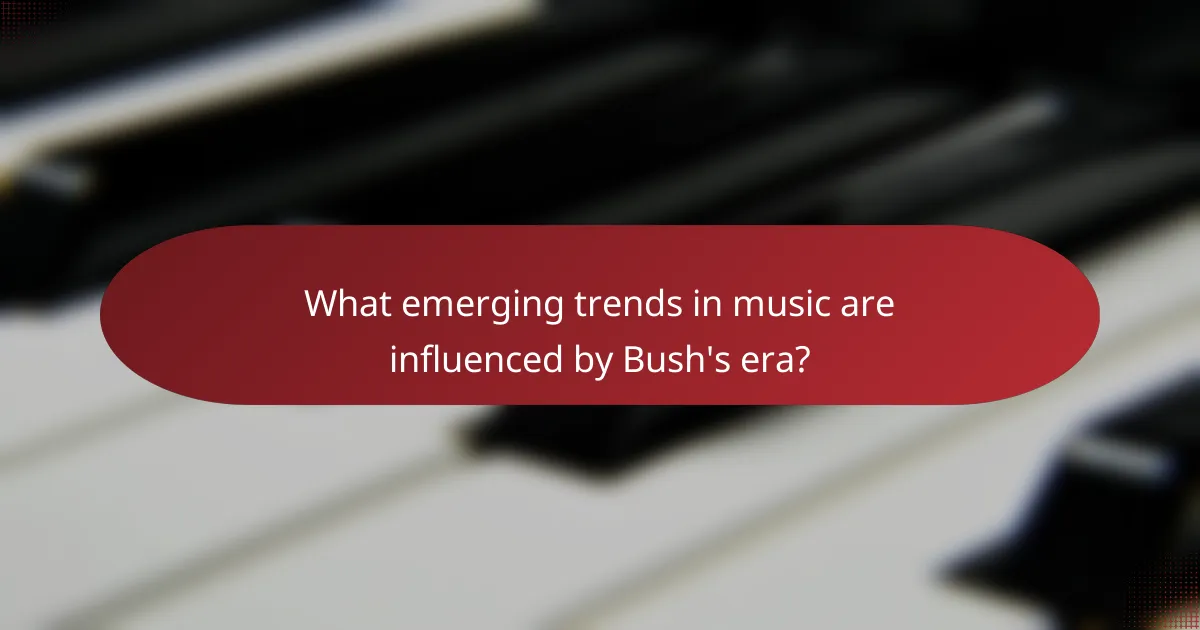
What emerging trends in music are influenced by Bush’s era?
The music landscape has seen a resurgence of politically charged themes and a blending of genres since George W. Bush’s presidency. Artists have increasingly used their platforms to comment on social issues, reflecting a growing trend towards activism in music.
Revival of political music
The revival of political music during and after Bush’s presidency has been marked by artists addressing pressing social and political issues. This trend has led to a new generation of musicians who are unafraid to voice their opinions through their lyrics, often drawing inspiration from the socio-political climate of the early 2000s.
Examples of this revival include genres like hip-hop and indie rock, where artists such as Green Day and Eminem have produced songs that critique government policies and societal injustices. This shift has encouraged listeners to engage with political discourse, making music a vehicle for activism.
To effectively participate in this trend, musicians should focus on authenticity and relevance in their messages. They can benefit from collaborating with organizations that align with their values, ensuring their music resonates with audiences seeking change.



